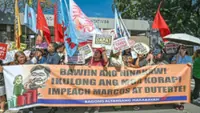The leaders of China and the Philippines have vowed to expand bilateral ties between the two nations, with Philippine President Ferdinand Marcos saying he looks forward to a state visit to China.
A Chinese statement released following talks on Thursday between Marcos and Chinese President Xi Jinping said the Philippine leader pledged his nation would not “choose sides” in diplomacy and would jointly “resist unilateralism and bullying acts”.





